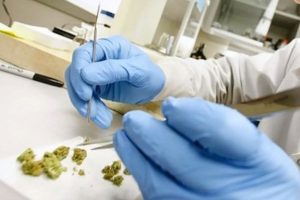
Hemp growers and manufacturers see a big hole in a new federal promise guaranteeing interstate hemp commerce – product testing.
The 2018 Farm Bill promised protection for hemp transportation but left states with no uniform way to test THC content.
So, cannabis plants that may go on a truck as legal hemp in one state can fail a THC test in another state and be seized as illegal marijuana.
The confusion has ruined promises to make hemp a true national commodity.
Consider:
- A Colorado CBD manufacturer that ordered 14,000 pounds of hemp from Oregon found half its shipment seized by Idaho authorities. Idaho maintains the hemp can’t pass through its state regardless of Farm Bill language on interstate commerce. The manufacturer, Big Sky Scientific, has appealed the decision but must wait months for an answer, while Idaho is free to let the hemp decay.
- Another Colorado CBD manufacturer, Panacea Life Sciences, saw a shipment of hemp from Kentucky seized last month in Oklahoma. The drivers carrying the hemp had paperwork from Kentucky showing they were carrying legal hemp, but the plants were taken anyway.
- A West Virginia hemp grower is ensnared in a federal drug case for allegedly illegally obtaining hempseeds from Kentucky. A federal judge cited the 2018 Farm Bill in ordering safe passage for the company’s hemp into Pennsylvania for extraction.
“There’s variability from plant to plant in how it’s going to test,” said Joe Crinkley, a spokesman for MCR Labs, which tests marijuana and hemp in Framingham, Massachusetts. “These are living things.”
Hemp cultivars prized for high CBD content are also likely good at making THC, leaving the CBD industry uncertain how its flower varieties might test.
Crinkley explained that flower varieties can easily go “hot,” meaning they exceed the 0.3% THC limit established by federal law.
The problem is exacerbated because there’s no national testing policy for determining THC content.
“From lab to lab, state to state, the testing should be accurate to whatever is in that bud,” Crinkley said.
“But what will be different is that any given bud from a batch could test slightly different. So, even if there’s very little deviation in an entire crop, you could have some plants within that crop that test 0.4% THC or somewhere that is going to be considered outside the legal range.”
Opportunity in hemp test confusion
For Boulder Botanical & Bioscience Labs, a CBD manufacturer and retailer in Golden, Colorado, state-to-state testing variances give CBD companies that aren’t moving hemp plants across state lines time to grab market share.
“The Farm Bill was great, but it still left a lot of individual states to regulate what they want in a (hemp) product,” said Christian Santi, the lab’s director of ingredient sales.
“There’s no uniformity across the board.”
His company sources all its hemp from within Colorado. Santi predicts that when national hemp-testing rules eventually materialize, CBD operators that can quickly adapt to those rules will thrive.
“Regulation helps us tremendously,” Santi said. “It gets rid of the riffraff, the mavericks. (If) you’re going to be in the industry, you’ll do it the right way.”
As the industry awaits a national testing standard to determine what is hemp and what is marijuana, some states are talking about updating outdated testing methods for themselves.
The updated tests won’t eliminate the problem of varying state testing methods, but they would eliminate the simple yes-or-no on whether the plants contain THC.
For example:
- Idaho lawmakers are considering spending $240,000 for in-state hemp testing devices, according to the Idaho Statesman.
- South Carolina’s State Law Enforcement Division terminated officer-conducted THC plant testing, instead opting for lab testing, The (Charleston) Post And Courier reported.
- Tennessee lawmakers might explore giving police officers new cannabis tests that can determine THC content, not just the cannabinoid’s presence, according to Murfreesboro radio station WMOT.
For now, testing halts commerce
Even if all states update their testing standards and the U.S. Department of Agriculture expedites a national guideline, the confusion has many CBD companies facing the delay of millions of dollars worth of product.
Big Sky Scientific’s attorney, Elijah Watkins, said the company will likely have to wait until this summer to find out whether Idaho will release its 7,000 pounds of raw hemp.
Big Sky’s hemp has been tested by four separate labs, he said, with all results showing the plants meet the federal hemp definition. Still, Idaho doesn’t want to release them.
Law enforcement, Watkins added, isn’t in the business of keeping cannabis plants in commercial shape, meaning police also could benefit from a national THC testing standard.
“It’s a difficult job that they have to do, so anything to help them out, we would welcome,” he said. “We’re going to follow the law and comply with whatever they come up with.”
Kristen Nichols can be reached at [email protected]

